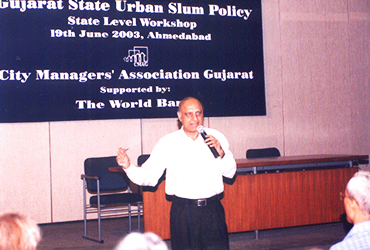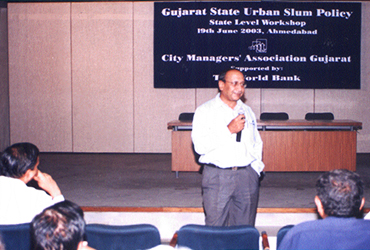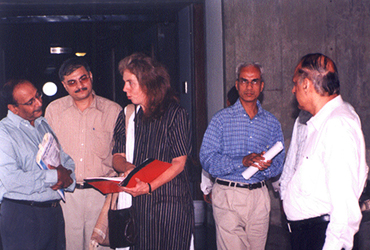

The World Bank has entrusted the work of providing technical assistance for the preparation of Gujarat State Urban Slum Policy to CMAG.
The Urban Development and Urban Housing Department (UD&UHD) of Government of Gujarat (GoG) is in the process of preparing the Gujarat State Urban Slum Policy (GSUSP) to encourage a coherent and coordinated approach to upgrading of services in slum settlements in the towns and cities of the State.
The policy will cover notification/denotification, granting of tenure, planning for integration, environmental improvement, access to social services, economic empowerment, financing sustainable services, improving creditworthiness of slum dwellers, shelter upgradation, and monitoring and evaluation.

The desire for growth at an accelerated pace has contributed to rapid urbanization. Migration from rural areas and smaller towns brings people to larger cities in search of more prospects in terms of economic growth. Recurrent droughts and failing of agriculture, division of land (and therefore economically unviable land holding) have also contributed in setting the trend for migration from rural to urban areas for livelihood. Regular income, even if comparatively less, is one of the determining factors to bring people from villages to cities.

Most of the migrants come with bare minimum household goods, without any certainty about job or any work. What they bring with them are hopes for better future (at least for their children) and readiness to work hard in unorganized sector as unskilled, casual worker. The cities require these types of people very much. However, what is available to new citizens as 'residence' is some space in pockets that are known as "slums". Residents of slums in urban areas are required to attend to many unskilled jobs in unorganized sector and yet the people who perform these tasks are more often perceived as an "unwanted" lot in the city.
The criterion for such perceptions is the place that accommodates slum residents. Citizens, other than the slum residents, belonging to middle to upper class dislike slum areas, as they are squalid. What is overlooked is the fact that slum residents live in the slums not out of choice but due to absence of choices and the survival instinct.
The National Action Plan for Good Urban Governance launched by the Government of India in September 2001 states that urbanisation of poverty is one of the key features of India's urbanisation process. While migrants place enormous strain on urban infrastructure, they must also be recognised as vital contributors to a city's economy. The global campaign for good urban governance aims to realise the 'inclusive city', one that provides space and voice to all its stakeholders.
It is time now that Gujarat state and its citizens, decision makers and well wishers recognize and accept slums as an integral part of the city, and that slum residents are legitimate citizens who contribute substantially to the growth of the city. There is a felt need to work towards making cities in Gujarat more viable by process of integration (of slums) rather than their exclusion.
Prior to the project, an initial consultation workshop was held in Ahmedabad on 5th December 2000 and there was general consensus between the NGOs, slum dwellers, elected representatives and civil servants present that:

The preparation of Gujarat State Urban Slum Policy (GSUSP) through a consultative process involving different stakeholders including, among others, local government elected representatives, local and state government officials, Non-Government Organizations (NGOs), Community Based Organizations (CBOs), community representatives and Private Sector agencies is to be undertaken and as part of the slum policy development process, it is expected that in this study, a consultative, participative process is facilitated so that all views and opinions are heard. The government is very keen to ensure that urban poor and vulnerable, particularly women, children including working children and SC / ST groups get the benefits of slum upgrading including full involvement in community organization and decision making, equal access to services and other such benefits that facilitate an equitable assignment of any land tenure rights.
In tandem with the Ahmedabad workshop, two more regional workshops were held in Surat and Rajkot in the months of October and November 2001 respectively. Individual, city/town level workshops were also conducted at Porbandar, Gandhidham, Jamnagar, Rajkot, Surat, Ankleshwar, Halol and Himmatnagar.
| August-Sept, 2000 |
|
|---|---|
| 28th Sept |
|
| 3rd October |
|
| 18th October |
|
| 19th October |
|
| 26th October |
|
| 2nd Nov |
|
| 9th Nov |
|
| 21st Nov |
|
| 1st Dec |
|
| 6th Dec |
|
| 1st Jan 2002 |
|
| 12th Jan |
|
CMAG has started receiving reports on the eight individual cities/towns. The Draft of the Land Tenure Study of Ahmedabad is also under scrutiny.
Meanwhile, a Peer Group has been formed from experts in the nation. This Group shall review the entire process of formulation of slum policy.